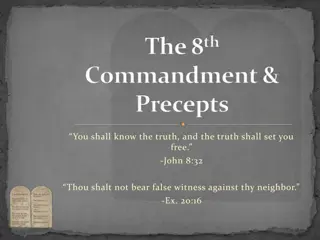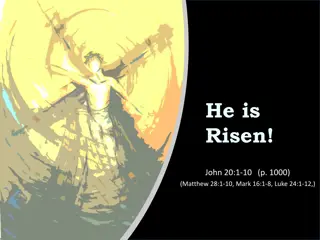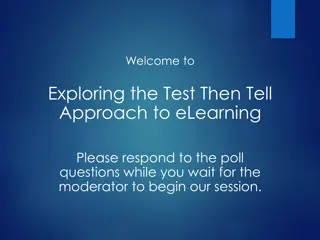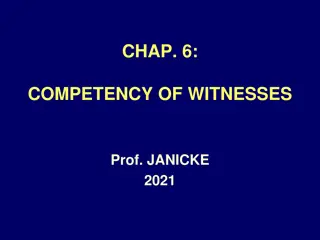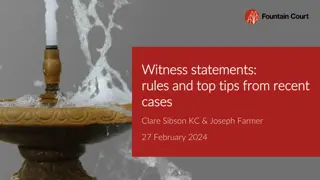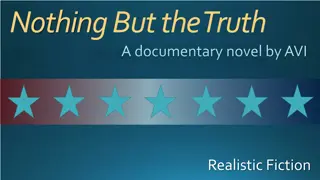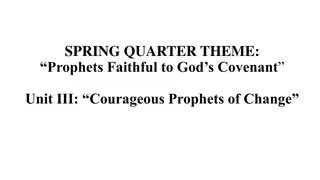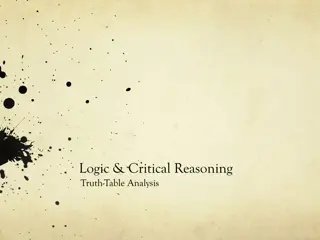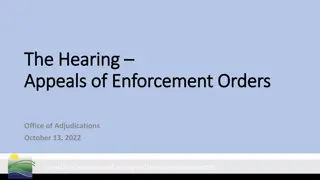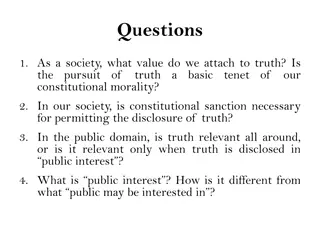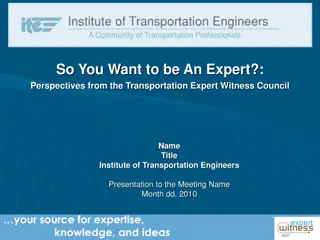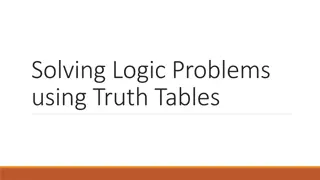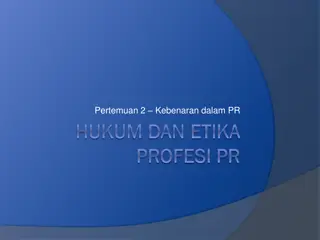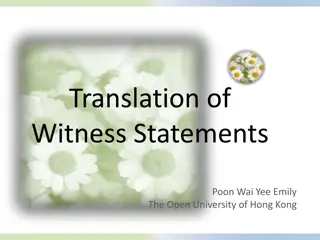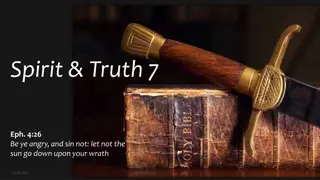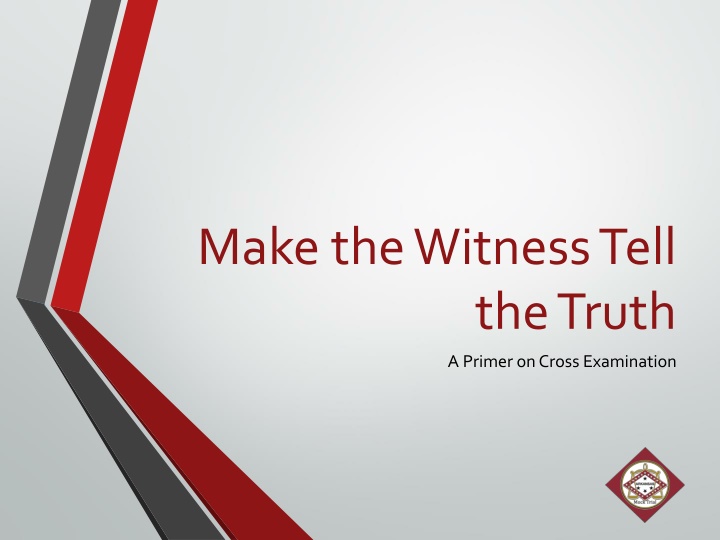
Mastering Cross Examination Techniques
Learn expert tips on cross examination from the primer "Make the Witness Tell the Truth" by Jordan B. Tinsley. Understand the importance of integrity, preparation, setting realistic goals, and tailoring your approach for effective cross examination.
Download Presentation

Please find below an Image/Link to download the presentation.
The content on the website is provided AS IS for your information and personal use only. It may not be sold, licensed, or shared on other websites without obtaining consent from the author. If you encounter any issues during the download, it is possible that the publisher has removed the file from their server.
You are allowed to download the files provided on this website for personal or commercial use, subject to the condition that they are used lawfully. All files are the property of their respective owners.
The content on the website is provided AS IS for your information and personal use only. It may not be sold, licensed, or shared on other websites without obtaining consent from the author.
E N D
Presentation Transcript
Make the Witness Tell the Truth A Primer on Cross Examination
Presented by Jordan B. Tinsley Former Chair, Mock Trial Committee Arkansas Bar Association Tinsley & Youngdahl, PLLC 300 South Spring, Suite 614 Little Rock, AR 72201 (501) 374-2099 jordan@tyattorney.com
Be the Truth Teller Everything you do in a trial, including cross examination, must lead the jury to a belief in your integrity, and the integrity of your case. Do not abuse your talent or these tips by manipulating a witness into presenting lies. This is not only unethical; it is also ineffective. Every juror wants to know the truth. You will win the trial if the jury perceives you as the truth teller and your case as the truth.
Be Prepared Like a Boy Scout Most mistakes on cross occur due to lack of preparation. Know the general knowledge you need. Background information. Example: Identification; expert. Latent information. Example: things the detective failed to do. Know the specific knowledge you need. Prior statements, relevant exhibits, biases, etc. Know everything about the case. Other witnesses, physical evidence, etc. Know the rules of evidence. Think about the admissibility of important points in advance. Important people will appreciate your preparation. 1) The jury; and 2) The witness
Advance Your Theory of the Case Develop a theory of the case that you integrate into every aspect of your presentation, including cross examination. If it doesn t advance your theory of the case, it is a waste of time. Use cross examination to gather material for closing argument. If you aren t going to argue a cross examination point in closing argument, it is a waste of time.
Set Realistic, Attainable Goals Cross examine with specific, reasonable (attainable) goals in mind. You re never going to get everything you want, so you have to be reasonable and realistic. Once you have accomplished the goals you set for yourself in advance, know when to quit. Expecting the witness to give you more than you can get provides an opportunity to explain or otherwise take the wind out of your sails.
Decide the Manner of Cross Use your knowledge from preparation to decide how to cross examine a particular witness based upon the following: The objectives of the particular cross examination. The specific characteristics of the witness. The facts and evidence ( the evidentiary situation ). The theory of the case. Once you have decided upon a manner of cross examination, don t stray from it when you re in the zone. Examples: Friendly, adversarial, playing dumb.
Control the Witness Use leading questions. Suggest an answer. One new fact per question. Example: The bush blocking the stop sign. Don t provide opportunities to explain. Phrase your question or statement so that it only elicits one of three responses: yes, no, or I don t know. Use short, declarative statements/questions. Avoid asking the judge for help. If the witness appears to eager to help one side, use that against them rather than asking the judge to scold them.
Use plain English You are not making any points if the jury doesn t understand the points you re making. Avoid lawyerly phrases. No: May I call your attention to your activities on the night in question Yes: On the night of May 3, 2014, you went out to dinner Make the technical points easier to understand. Get an expert witness to agree with your simple explanations of complex concepts. Avoid Isn t it true and/or correct?
Get In and Get Out Wasting time is bad. Brevity is emphasis. You want the jury to remember the points you are making. If you make too many points, or make unnecessary points, you detract from the points you want the jury to remember. Repetition is terrible. See above. Repetition of the direct examination is the worst thing you can do, because it will reinforce the other side s points to the jury.
Primacy and Recency The theory of primacy holds that the jury will remember the first thing you do, so make an important and significant point very early. Gain some credibility early on. You will need it later. The theory of recency holds that the jury will remember the last thing you do, so end on a high note. In mock trial, this is difficult because of time constraints. Hold back a very important point that you can make quickly and use it to end when you need to get out. This is doubly important with a tough witness.
Spice it Up Find ways to make your cross examination more interesting, particularly if it will be lengthy. Incorporate an exhibit or visual aid of some type. Make a joke, if it s appropriate and realistic and fits in with your chosen manner of cross examination.
Dont Ask One Question Too Many Since you are using cross examination to gather material for closing argument, you don t need to connect all the dots during cross examination. Leave some meat on the bone for the closing. If you ask one question too many, the witness will take the wind out of your sails. Deal with facts, not conclusions, and understand the difference. No: You were intoxicated? Yes: You drank ten beers and took three Xanax?
Dont Question Without Knowing the Answer Don t ask a question to which you don t know the answer. Although everyone has heard this rule of cross examination a million times, real attorneys still violate it constantly. This is generally caused by unrealistic goals. When it is not caused by unrealistic goals, it is caused by a lack of preparation.
Avoid Arguing with the Witness An argument is a two-way street. You cannot argue with a person you control. Phrase your questions in a manner that will elicit the answer you want. If the witness goes out of his or her way to give a different answer, know how to use that against the witness. Example: If a witness won t admit something that is common sense because the witness is too eager to help one side, you should emphasize this obvious bias without allowing the witness to regain any control. Know the difference between tough and mean, confidence and arrogance, and between control and dominance. The jury will know the difference.
Establish a Rhythm and Maintain Momentum The best cross examiners will get in a rhythm and that rhythm itself will control the witness. Use your control techniques to develop a rhythm. If you find your own style and get comfortable, it becomes easier to find this rhythm. Once you have established a rhythm, guard it with your life and don t do anything to break it. Don t give the witness a break or otherwise take away the momentum of the cross examination.
Emphasize the Favorable Facts Rather than Impeachment It is always better to use cross examination to elicit favorable facts that advance your theory of the case, if you can. If you can t use the witness to elicit favorable facts, impeach the witness, because you can t really do both. You either want the jury to believe the witness, or you want the jury to think the witness is a liar, and the jury won t do both. Before you impeach, the witness should earn it.
Avoid the Tendency to Over- impeach Impeachment with a prior, inconsistent statement is time-consuming because you have to utilize a very specific process to make it work and maximize the impact. This is especially true in mock trial, when you have time limits. Don t impeach just because you can. You should only impeach if: It advances your theory of the case. It aligns with your chosen manner of cross examination. You don t want the jury to believe the witness. You are prepared to do it right. You have time to do it right. It is important. Yes: I have testified as an expert for the defense before. No: I have really given 63 depositions instead of 65.
Methods of Impeachment Prior, inconsistent statement. Although this is most common, it is not the only method. Bias, interest, or prejudice. Examples: expert witness fees, friends with P, etc. Prior, admissible convictions. Examples: fraud, perjury, etc. Prior, admissible bad acts. Pay attention to the rules of evidence. Inadequate opportunity to perceive. Example: The lady with glasses in My Cousin Vinny. Contradiction by other evidence. Physical evidence, if possible.
Pay Attention, Be Flexible, and Adapt Know when to break the rules. These are really more like red flags or guidelines than they are rules. There are circumstances in which breaking one of the foregoing rules is exactly the right thing to do, so you need to fully understand these concepts in order to know when it may be appropriate to break them. Example: A witness with whom you hoped to use a friendly manner earns an impeachment in front of the jury.



